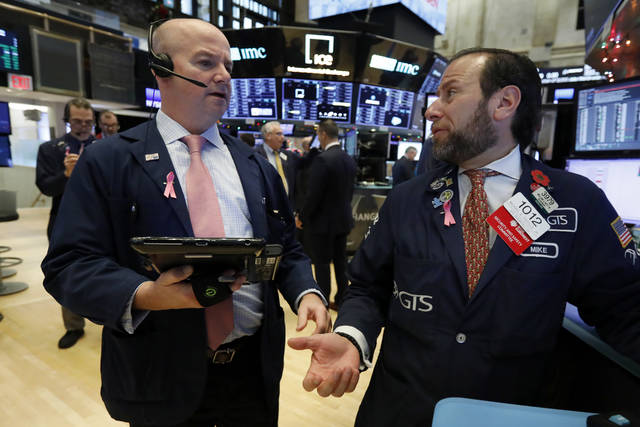NEW YORK — U.S. stocks finished lower Thursday after an afternoon rally faded away. Banks and technology companies fell after the market pulled off a huge rally the day before.
Deutsche Bank dropped after German authorities raided its offices on suspicion some of its employees helped clients launder money. Financial stocks fell as interest rates again edged lower. Crude oil prices climbed after they briefly dipped under $50 a barrel overnight. The rebound helped energy stocks trade higher. Health care companies, which have climbed over the last month, continued to do better than the rest of the market.
The Federal Reserve released minutes from its meeting in early November. Officials expressed concerns about a variety of threats to the economy, including the impact of tariffs, a slowing global economy and tightening financial conditions amid falling stock prices. The assessment was in line with comments Wednesday from Federal Reserve Chairman Jerome Powell.
“That’s what the Fed is trying to put out there, is they haven’t gotten carried away with rate increases,” said Thomas Martin, portfolio manager at Globalt Investments in Atlanta. “The market wants to see … that they are going to be gradual.”
The S&P 500 index shed 6.03 points, or 0.2 percent, to 2,737.76. The Dow Jones Industrial Average recovered from a loss of 163 points and ended down just 27.59 points, or 0.1 percent, to 25,338.84.
The Nasdaq composite slid 18.51 points, or 0.3 percent, to 7,273.08 as tech stocks dipped. Smaller companies, especially banks and industrial stocks, fared worse. The Russell 2000 index of smaller-company stocks lost 5 points, or 0.3 percent, to 1,525.39.
The S&P 500 index was coming off its largest rally in eight months and has climbed 4 percent this week. It finished at a six-month low on Friday.
Benchmark U.S. crude rose 2.3 percent to finish at $51.45 a barrel in New York. Brent crude edged up 1.3 percent to $59.51 a barrel in London.
EOG Resources rose 1.6 percent to $105.47 and Anadarko Petroleum gained 2.2 percent to $53.70. The S&P 500 index of energy companies has dropped 12 percent over the last three months, worse than any of the other major market sectors. The S&P 500 itself has fallen 6 percent over that time.
Health care stocks, meanwhile, have jumped 7 percent in the last month, about double the gains in the broader market. On Thursday drugmaker Pfizer picked up 1.4 percent to $45.51 and medical device maker Medtronic added 1.3 percent to $96.60.
Stocks rallied Wednesday after Powell suggested in a speech that the Fed might be almost done raising interest rates, and is willing to stop raising rates at least temporarily so it can assess the effects of the last few years of increases. Investors have been nervous that climbing interest rates will contribute to a damaging slowdown in economic growth. That fear is one of the major reasons behind the slide in stocks this autumn.
“In September, the feeling (in the markets) was more confident,” Martin said. “Third quarter earnings reports, I think, really started to change that, and the continuing weakness of data overseas, in Europe and the rest of the world, has changed that.”
Bond prices edged higher. The yield on the 10-year Treasury note fell to 3.03 percent from 3.04 percent. Banks fell as investors expected slower increases in interest rates, which reduce the profits banks make from mortgages and other types of loans. Bank of America shed 1.4 percent to $28.04 and Bank of New York Mellon slid 1.8 percent to $50.68.
Deutsche Bank stock lost 4.8 percent to $9.42. German authorities suspect that Deutsche Bank employees helped clients set up offshore companies in tax havens to launder hundreds of millions of euros. A prosecutor in Frankfurt said the investigation emerged from an analysis of documents leaked from tax havens in recent years, including the 2016 “Panama Papers.”
While most health care stocks rose, medical lab operator Quest Diagnostics sank 9.3 percent to $87.94 after it cut its annual profit and revenue forecasts. The company cited a host of problems including larger reserves and reduced testing volumes. Rival LabCorp fell 2 percent to $161.81.
Qualcomm stock gained 2.6 percent to $58.11 after Qualcomm CEO Steve Mollenkopf said in an interview with CNBC that the company is close to resolving its long and costly dispute with Apple. Apple stopped making licensing fee payments to Qualcomm following a legal dispute between the companies, and later decided to stop using Qualcomm parts in some of its products.
But other technology companies fell. Intel lost 2.4 percent to $47.70. Apple slipped 0.8 percent to $179.55 and Microsoft dipped 0.8 percent to $110.19.
In other commodities trading, wholesale gasoline jumped 4.1 percent to $1.45 a gallon. Heating oil edged up 0.3 percent to $1.84 a gallon. Natural gas slipped 1.1 percent to $4.65 per 1,000 cubic feet.
Gold was little changed at $1,230.40 an ounce. Silver slipped 0.4 percent to $14.40 an ounce. Copper lost 0.9 percent to $2.79 a pound.
The dollar slid to 113.43 yen from 113.53 yen. The euro edged up to $1.1389 from $1.1376.
The FTSE 100 in Britain and the French CAC 40 both rose 0.5 percent. Germany’s DAX finished little changed.
Tokyo’s Nikkei 225 rose 0.4 percent and Seoul’s Kospi advanced 0.3 percent while Hong Kong’s Hang Seng shed 0.9 percent.
————
AP Markets Writer Marley Jay can be reached at http://twitter.com/MarleyJayAP


